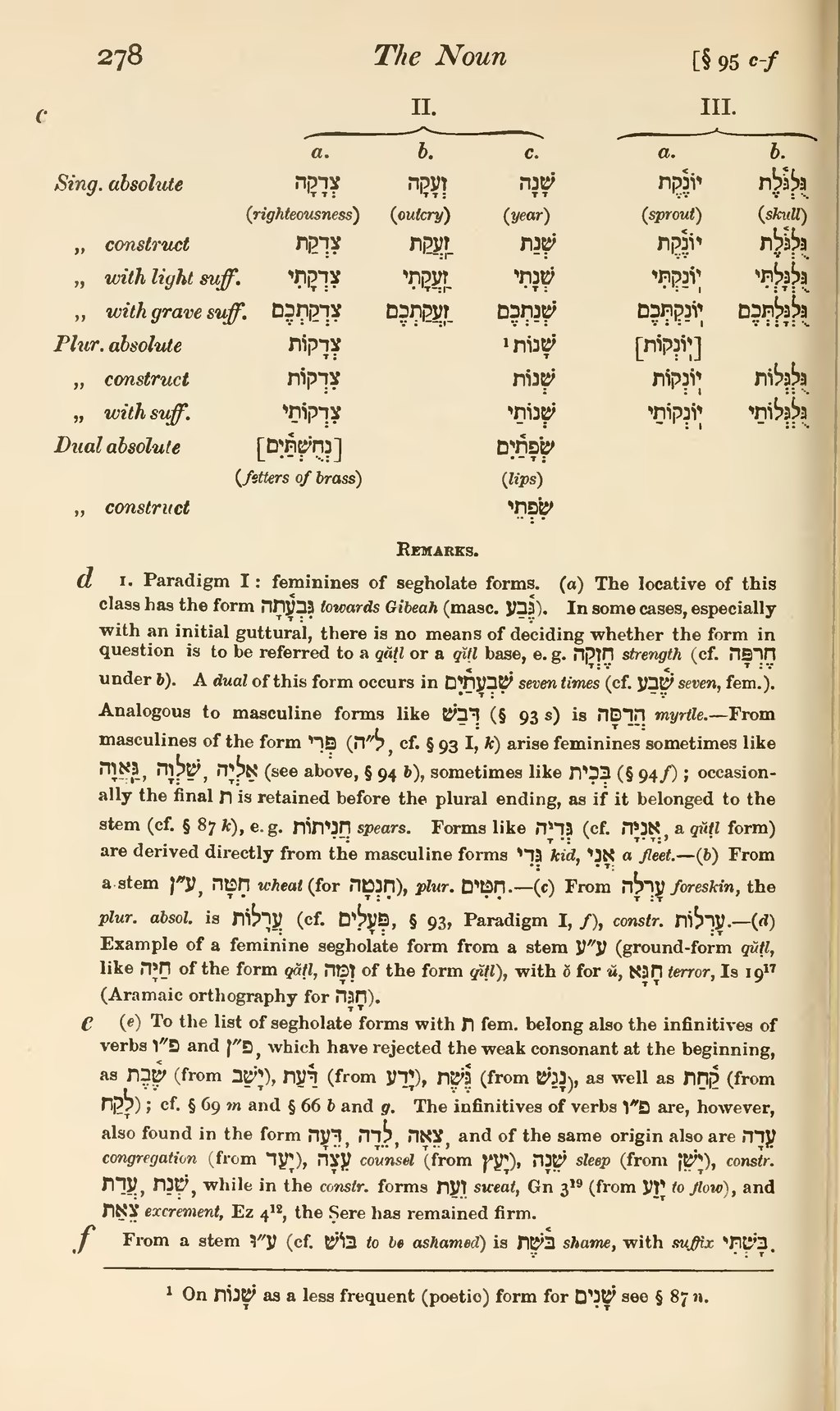| II. | III. | ||||
| a. | b. | c. | a. | b. | |
| Sing. absolute | צְרָקָה | זְעָקָה | שָׁנָה | יוֹנֶ֫קֶת | גֻּלְגֹּ֫לֶת |
| (righteousness) | (outcry) | (year) | (sprout) | (skull) | |
| Sing. construct | צִדְקַת | זַֽעֲקַת | שְׁנַת | יוֹנֶ֫קֶת | גֻּלְגֹּ֫לֶת |
| Sing. with light suff. | צִדְקָתִי | זַֽעֲקָתִי | שְׁנָתִי | יֽוֹנַקְתִּי | גֻּלְגָּלְתִּי |
| Sing. with grave suff. | צִדְקַתְכֶם | זַֽעֲקַתְכֶם | שְׁנַתְכֶם | יֽוֹנַקְתְּכֶם | גֻּלְגָּלְתְּכֶם |
| Plur. absolute | צְרָקוֹת | [1]שָׁנוֹת | [יֽוֹנְקוֹת] | ||
| Plur. construct | צִדְקוֹת | שְׁנוֹת | יֽוֹנְקוֹת | גֻּלְגְּלוֹת | |
| Plur. with suff. | צִדְקוֹתַי | שְׁנוֹתַי | יֽוֹנְקוֹתַי | גֻּלְגְּלוֹתַי | |
| Dual absolute | [נְחֻשְׁתַּ֫יִם] | שְׂפָתַ֫יִם | |||
| (fetters of brass) | (lips) | ||||
| Dual construct | שִׂפְתֵי | ||||
Remarks.
[d] 1. Paradigm I: feminines of segholate forms. (a) The locative of this class has the form גִּבְעָ֫תָה towards Gibeah (masc. גֶּ֫בַע). In some cases, especially with an initial guttural, there is no means of deciding whether the form in question is to be referred to a qăṭl or a qĭṭl base, e.g. חֶזְקָה strength (cf. חֶרְפָּה under b). A dual of this form occurs in שִׁבְעָתַ֫יִם seven times (cf. שֶׁ֫בַע seven, fem.). Analogous to masculine forms like דְּבַשׁ (§ 93 s) is הֲדַסָּה myrtle.—From masculines of the form פְּרִי (ל״ה, cf. § 93 I, k) arise feminines sometimes like גַּֽאֲוָה, שַׁלְוָה, אַלְיָה (see above, § 94 b), sometimes like בְּכִית (§ 94 f); occasionally the final ת is retained before the plural ending, as if it belonged to the stem (cf. § 87 k), e.g. חֲנִיתוֹת spears. Forms like גְּדִיָּה (cf. אֳנִיָּה, a qŭṭl form) are derived directly from the masculine forms גְּדִי kid, אֳנִי, a fleet.—(b) From a stem ע״ן, חִטָּה wheat (for חִנְטָה), plur. חִטִּים.—(c) From עָרְלָה foreskin, the plur. absol. is עֲרָלוֹת (cf. פְּעָלִים, § 93, Paradigm I, f), constr. עָרְלוֹת.—(d) Example of a feminine segholate form from a stem ע״ע (ground-form qŭṭl, like חַיָּה of the form qăṭl,, זִטָּה of the form qĭṭl), with ŏ for ŭ, חָגָּא terror, Is 19 (Aramaic orthography for חָגָּה).
[e] (e) To the list of segholate forms with ת fem. belong also the infinitives of verbs פ״ו and פ״ן, which have rejected the weak consonant at the beginning, as שֶ֫בֶת (from יָשַׁב), דַּ֫עַת (from יָדַע), גֶּ֫שֶׁת (from נָגַשׁ), as well as קַ֫חַת (from לָקַח); cf. § 69 m and § 66 b and g. The infinitives of verbs פ״ו are, however, also found in the form דֵּעָה, לֵדָה, צֵאָה, and of the same origin also are עֵדָה congregation (from יָעַד), עֵצָה counsel (from יָעַץ), שֵׁנָה sleep (from יָשֵׁן), constr. עֲדַת, שְׁנַת, while in the constr. forms זֵעַת sweat, Gn 3 (from יָזַע to flow), and צֵאַת excrement, Ez 4, the Ṣere has remained firm.
[f] From a stem ע״וּ (cf. בּוֹשׁ to be ashamed) is בּ֫שֶׁת shame, with suffix בָּשְׁתִּי.

